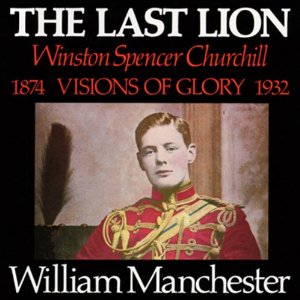First off an appropriate quote on the value of history from Winston himself: “The longer you look back, the farther you can look forward.”
Listened to this book on CD – 32 of them if I remember correctly. The narrator, Frederick Davidson, initially cracked me up but I ended up really enjoying him – British accent, and he gave all the “characters” different voices. High pitched for the ladies, a whiny child’s voice for young Winston and a decent Churchill impression for his later years. He even sang songs a capella when they were quoted in the text.
This monstrous book is undoubtedly a biography, but as Winston was inextricably tied up in the general history of the times it was also a pretty good history of the Victorian British Empire and on into World War One. I was surprised to learn of the selfishness and neglect from both of Winston’s parents. His mother was a flapper before it became popular, and his father despised him and seemed generally to be a disagreeable individual. Winston was basically raised by his nanny, “Woom.” Despite the neglect, his father was his hero and a life in politics, following in his father’s footsteps, was never a question for Winston.
Winston, nurtured by Macaulay and Gibbon, was a gifted writer from early on. After graduating from Sandhurst, he became what we would today call a war correspondent. Although a cavalry officer himself (and gifted polo player), he didn’t really care much for military life, but was fascinated by its potential to make him famous and therefore able to win elections. He used his mother’s flirtatious connections with the rich and powerful to obtain opportunities to “be there” at various hot spots: Cuba (observer of Spain putting down a native rebellion), Afghanistan, Egypt/Sudan. (One of his early postings was to India; when the ship was approaching the docks he wrenched his shoulder climbing an iron ring. This gave him shoulder troubles the rest of his life. He resolved to carry a pistol since he was not confident he could adequately wield a cavalry saber. He says this unconventional decision to carry a pistol likely saved his life at Omdurman.)
During the Second Boer War, Winston was captured by the Boers but later escaped from prison camp alone, hopped a train and was eventually smuggled out to Portuguese Africa by British sympathizers. On this adventure and in other battles he was always daring, fearless, and didn’t regard his own safety. I got the impression of some calculated bravery on his part — he either thought he was invincible, or maybe was just fatalistic “if it happens, it happens” and chose to live the brave life because that was what would win votes. Makes me think if he and other similar “war heros” were just lucky winners of survivor bias — I wonder how many others were like him, but not so lucky.
In politics, Winston was one-of-a-kind. He started out with the Conservative party like his father, then opportunistically jumped to the Liberals. Then when their star faded, he jumped back to the Conservatives. “Anybody can rat, but it takes a certain amount of ingenuity to re-rat.” I don’t think he was ever really solid Conservative or Liberal; he was always just Winston.
As First Lord of the Admiralty, Winston took the fall for Gallipoli, even though all agreed it was a good plan at the beginning. It just suffered from a botched execution, starting with the Czar’s insistence on laying claim to Constantinople when allowing Greece to take it would have pulled them in to the Allied side, and continuing with the timidity of de Robeck and incompetence of Hamilton. After being forced out of the Admiralty, Winston re-joined the army and spent five months commanding a battalion on Western Front. Here he exhibited the same disregard for his personal safety as did before.
Winston presciently saw the potentials of new military technology. He was an early proponent of airplanes; he even took flying lessons himself. During the War he saw great benefit to the tank at breaking the trench stalemate when no one did. He oversaw the introduction of the tank as Minister of Munitions, and claimed success after the battle of Cambrai. (The Germans took note too, and would come back with their own Panzers in 1939!)
As written in the book, World War One was nearly lost before the Americans arrived just in the knick of time. Maybe the Germans were pressing hard precisely because they knew time was short before the arrival of the American hordes? In any case, there was almost a silly perception in Britain that “we won the war” when their whole strategy of attrition failed miserably (British losses were almost always proportionally greater than German losses). Once the Russians were out, I think to anyone it’s clear that Britain was saved only by American involvement. Winston said something to the effect that “if all we get out of this war is lasting friendship with the Americans, it will be well worth it” That’s about all they did get out of it; the near term gains of Versailles were not lasting, Britain lost an entire generation of its bravest men and the Empire was poised for dismemberment.
Two other random WWI events that I found fascinating:
- The “football charge” — “The Surreys Played the Game”
- The scuttling of the German fleet at Scapa flow, and the subsequent uses of the large quantities of pre-atomic age steel.
